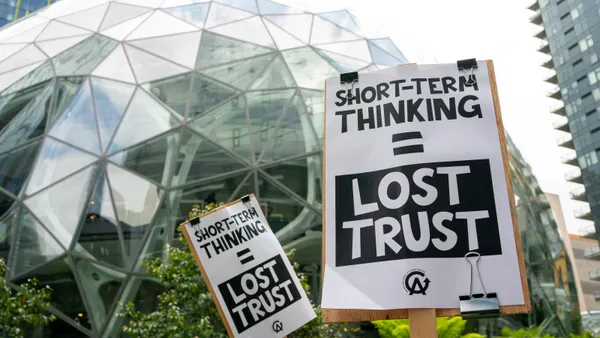Dive Brief:
- More than a third of workplaces are "mostly not" or "definitely not" inclusive of differing political perspectives among staff, according to the October 2019 Omnibus survey published by the Society for Human Resource Management (SHRM).
- According to the survey of 522 working Americans, most respondents who don't think their workplace is politically inclusive (60%) did not know whether their employers were working to become more inclusive — and almost a third stated that their organization isn't working to remedy this.
- Fifty-six percent of respondents stated that politics and discussion of political issues have grown more common over the last four years. Perhaps for this reason, 42% of respondents said they had personally experienced political disagreements in the workplace, and 44% said they had witnessed or observed them. Eleven percent of respondents said they had received differential treatment (either positive or negative) due to their political views, while 12% reported having experienced political affiliation bias (again, either positive or negative).
Dive Insight:
Politics at work is obviously a hot topic right now, and a potentially disruptive one. While nearly half (49%) of workers in a 2018 Randstad US survey said they enjoyed talking about politics with colleagues, over one-third (38%) had been involved in heated political arguments at work. Seventy-two percent of respondents to Randstad said they felt anxious or stressed from such heated arguments, and 44% said these arguments affected their productivity.
Cracking down on political conversations and activity may not be the answer, however. Only a fifth of workers in a 2018 Indeed survey said they wanted more censure of political discussions, and in a separate survey published in September by B2B solutions firm Clutch, only 29% of employees ages 18 to 34 said employers should regulate political talk on social media.
It's important for employers to foster a culture of respect, professionalism and tolerance around politics and other potentially contentious issues. Additionally, experts note that inclusion in the workplace does not have to be a zero-sum game. Companies can create a culture of openness, lead from the top, and embrace efforts to embed inclusion plans into operational frameworks.









